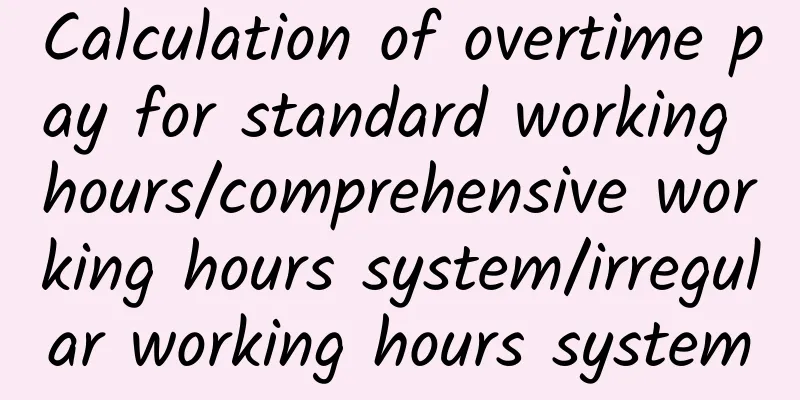Calculation of overtime pay for standard working hours/comprehensive working hours system/irregular working hours system

|
Standard working hours system: The maximum working hours per day for workers are 8 hours, and the maximum working hours per week are 40 hours. Employers should ensure that workers have at least one day off per week. Due to production and operation needs, after consultation with the trade union and workers, the daily extension of working hours shall not exceed 1 hour. For special reasons, the daily extension of working hours shall not exceed 3 hours, and the monthly extension of working hours shall not exceed 36 hours. According to relevant laws and regulations, if workers are arranged to work overtime, they shall be paid wages not less than 150% of their wages; if workers are arranged to work on rest days and no compensatory leave is arranged, they shall be paid wages not less than 200% of their wages; if workers are arranged to work on statutory holidays, they shall be paid wages not less than 300% of their wages. Comprehensive working hours system: For employers who implement this working hours system, the working hours are no longer calculated in days, but in weeks, months, quarters, or years. This means that if the actual working hours on a specific day (or week) in a comprehensive calculation cycle exceed 8 hours (or 40 hours), but the total actual working hours in the comprehensive calculation cycle do not exceed the total legal standard working hours, it is not considered overtime. Only when the total working time in the cycle exceeds the approved standard time is it considered overtime, and the salary remuneration shall not be less than 150% of the salary; working on statutory holidays is considered overtime, and the salary remuneration shall not be less than 300% of the salary. Irregular working hours: Under this working system, workers do not have fixed working hours on each working day. The extended working hours of workers who are approved to implement irregular working hours are not subject to the daily extended working hours standards and monthly extended working hours standards stipulated in Article 41 of the Labor Law. For workers who implement irregular working hours, there is no overtime work except for working on statutory holidays. For those who work on statutory holidays, they shall be paid wages not less than 300% of their wages. Reminder: Employees who implement the comprehensive working hours system and irregular working hours system still enjoy the statutory right to rest. According to Article 6 of the Ministry of Labor's "Approval Measures for Enterprises to Implement Irregular Working Hours and Comprehensive Working Hours System", for employees who implement other work and rest methods such as irregular working hours and comprehensive working hours system, enterprises should, in accordance with the relevant provisions of Chapter 1 and Chapter 4 of the "Labor Law", on the basis of protecting the health of employees and fully listening to the opinions of employees, adopt appropriate methods such as centralized work, centralized rest, rotating rest, flexible working hours, etc. to ensure the employees' right to rest and vacation and the completion of production and work tasks. Therefore, employers should pay attention to the rest time arrangements for these two types of employees on the working hour system. If employees are not properly arranged to rest, the employees can unilaterally terminate the labor contract on the grounds that the employer "fails to provide corresponding working conditions" in accordance with Article 38 of the Labor Contract Law, and require the employer to pay corresponding economic compensation. |
<<: SA8000 Certification Management Review
>>: Provisions on Labor Protection for Female Employees
Recommend
eBay Super Topic Ranking: Review Management: "What should I do if I receive a negative review during delivery?"
Most transactions on eBay go very smoothly, and m...
Timberland factory inspection list 1, 2
Will each of the following documents be available ...
Common fire safety issues and solutions during BSCI factory audits (IV) Fire safety inspection failure
Problem phenomenon: Fire inspection failed. Solut...
2013 Mid-Autumn Festival Holiday Arrangement
In August, the sky is clear and the water is beau...
FAQ about eBay payment collection? Students who have questions about eBay payment collection can take a look here~
As one of the four major cross-border e-commerce ...
How is the International Trade Law Network? What does the International Trade Law Network contain?
The team of International Trade Law Network is co...
How to obtain OCS certification?
OCS certification application process: 1. Applica...
What is the difference between eBay and Eachnet? eBay sellers, come on!
eBay and Eachnet are two platforms with similar n...
European Linen Supply Chain Management Implementation Rules
1. Objectives and scope of application This proce...
What is the difference between XMind mind mapping and other mind mapping tools?
1. 100% pure Chinese. XMind has changed the curre...
GRS factory audit checklist quality documents
GRS factory inspection quality documents: Documen...
Linkfluence and Spredfast Sign Strategic Technology Cooperation Agreement
Linkfluence accelerates the development of its in...
ACC Certification Introduction
The Aquaculture Certification Council (ACC) is an...
How is Yanghe Supply Chain? What are the advantages of Yanghe Supply Chain?
How about Yanghe Supply Chain? Shanghai Yanghe Su...
Benefits of implementing ISO14000 environmental management system certification
Implementing ISO14000 environmental management sy...









